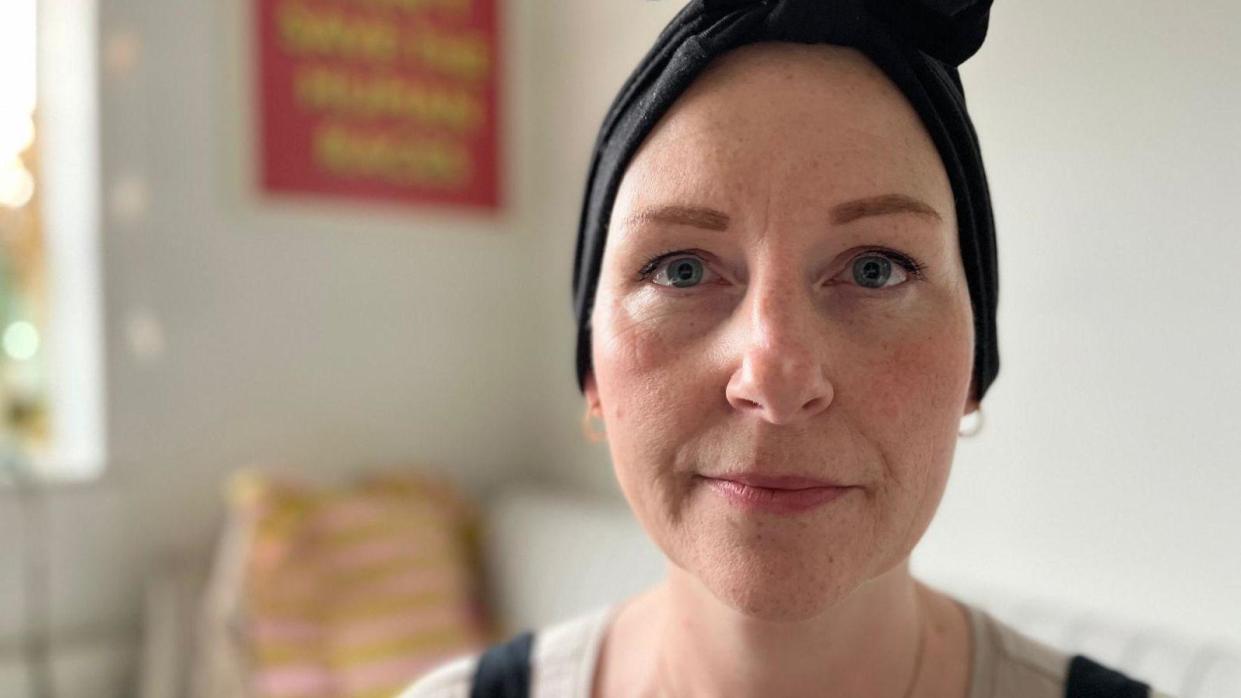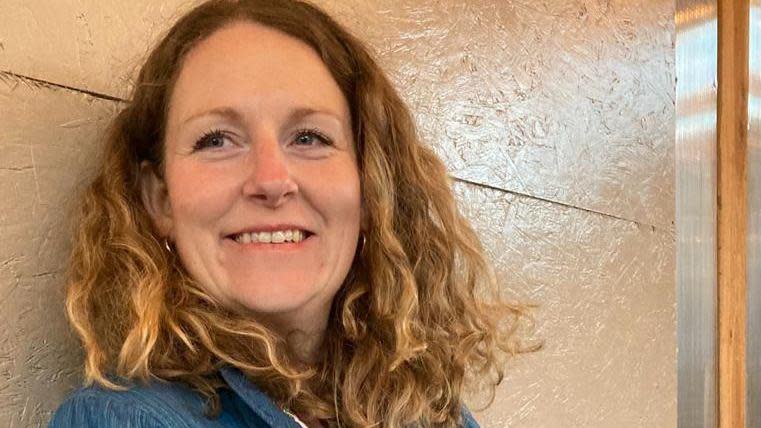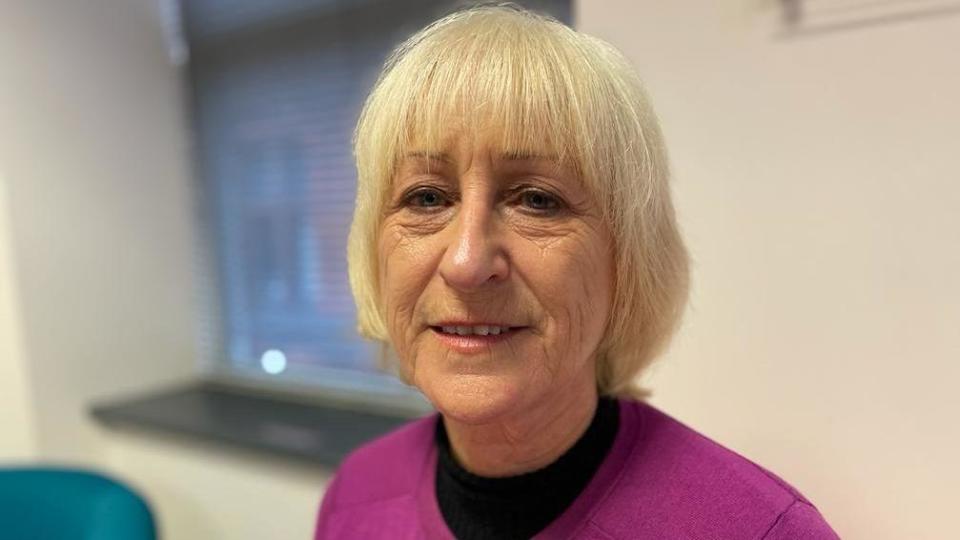Hundreds with gynaecological cancer feel ignored

A woman who was diagnosed with a gynaecological cancer two years after raising symptoms with her GP said she has been approached by about 200 people who also felt they were ignored.
The number of patients being treated for gynae cancers within the target 62 days has worsened since it was prioritised by the Welsh government.
Women have spoken of their disappointment at the government’s response to a report which called for improvements, describing the attitude as "dismissive".
The Welsh government said it was "sorry and disappointed to hear that not all women have received the best possible care".
Claire O’Shea now has stage four cancer and has set up a group called Claire’s Campaign, to amplify the voices of those who feel their symptoms were repeatedly dismissed by professionals.
The 41-year-old from Cardiff was diagnosed with uterine leiomyoscarcoma in December 2022, but the rare, aggressive cancer spread to her lungs, liver and sacrum bone within a few months.
She is now on palliative chemotherapy to try and stabilise the tumours.
She gave evidence to a recent Senedd committee inquiry into gynaecological cancers, but said the government’s response to that report left her disappointed and underwhelmed.
The report published in December concluded that women's cancer concerns were "dismissed, downplayed and unheard" and described a "dangerous bias" against women that needs to be stamped out.
Ms O'Shea said the government's response to the report left her feeling "there’s nothing there that feels like they’re going to meet the challenge."
"Even though gynaecological cancer has been a priority for a year or so, only 32% of women are now hitting the pathway (target).
"So to say they are taking it seriously and they are making changes – when the results have got worse – doesn’t feel particularly good."
Of the 200 people who contacted Ms O’Shea, she said:
One woman was told "to shower more frequently" when she raised symptoms, but was found to have endometrial cancer
Another was misdiagnosed with IBS and ovarian cancer was only discovered when she turned up at A&E on the verge of kidney failure
Two women were told their symptoms were "just the menopause" before being diagnosed with stage four cancers
Another had symptoms put down to HRT "needing a tweak" and the subsequent referral wasn’t marked urgent as she had recently had a smear
About 1,200 women in Wales are diagnosed with a gynaecological cancer each year and 470 die.
Health Secretary Eluned Morgan asked cancer leaders in March 2023 to give gynaecological cancers an "enhanced focus".
At the time 34.6% of patients started treatment within the two-month target.
While performance initially improved, there has since been a sharp deterioration and the most recent figures were 32.2%, a year after it was given greater priority.
The government accepted the majority of the 26 recommendations from the health and social care committee’s report but said patient surveys showed the vast majority consistently report "high levels of patient satisfaction".
It is a point that has angered those who took part in the inquiry.
Judith Rowlands gave video evidence to the committee about her poor experience, but died before the report was published.
Her daughter Sioned Cash questioned the methodology behind the survey as those with poor experiences can be left "too gravely ill to be able to participate".
"By making this claim at the start of the response, they set the tone for the rest of the report to be one which is quite dismissive of there being any issues," she said.

Ms O’Shea said: "The more I heard it from other people the more I realised it is a serious, serious problem.
"It's happening to lots of women and I wanted to harness that. I wanted those voices to be heard.
"The amount of women who've told me they felt unheard or were ignored – they had three, four, five appointments before they were referred to cancer pathways.
"Or they already had cancer and their pain was dismissed and it had spread. I want women to feel empowered and I want women to have a route to tell that story and have it go somewhere."
"The amount of families who have been devastated by that and feeling a sense of responsibility – like they should have done more. And if they couldn't do more then, they want to do a bit more now.
"I'm hoping that through Claire's Campaign, even when I'm not feeling particularly well or haven’t got the capacity to campaign on my own that there is somewhere where we can receive these stories.
"Because something good has to come out of these experiences."
The report is due to be debated in the Senedd on Wednesday.
Ahead of the debate, chairman of the committee, Conservative Member of the Senedd Russell George said, "There are several areas in the Welsh government’s response which require further examination.
"The delay in delivering a women’s health plan for Wales, the recovery of services disrupted by the Covid 19 pandemic and the unacceptably high number of people diagnosed through emergency admissions at A&E are all concerning.
"Significantly, although the cabinet secretary accepted 24 of our report’s recommendations, either in full or in part, her response does not commit to any additional funding."

It's a point picked up by Judi Rhys, chief executive of Tenovus Cancer Care, who said while not all areas required funding, there was an "urgent need for clinical research and that is going to need investment".
She said she also feared lip service was being paid to the issues raised.
"There is a massive frustration, certainly amongst the cancer clinical community that there is not resource following this.
"But the bravery shown by the women who gave their evidence really struck me.
"They and their families absolutely want to see a result from that, and at the moment we’re holding our breath to see if that will be the case."
The Welsh government said: "We expect the NHS to learn from these experiences and address the issues.
"We also accept that performance for gynaecological cancer is not where it should be and have launched a £2m national programme to improve performance for gynaecological, urological, and lower gastrointestinal cancers."

